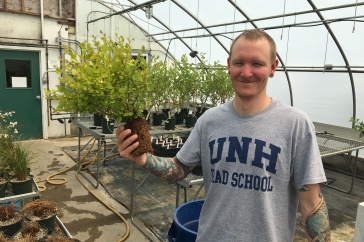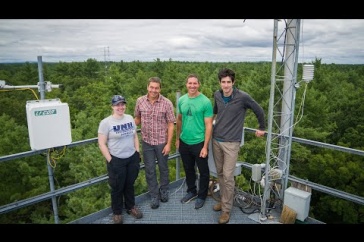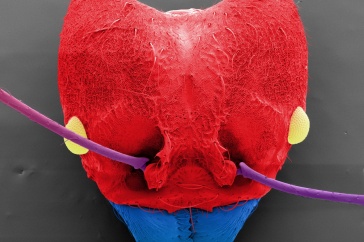
The Stordalen mire in Abisko, Sweden, a subarctic region where Assistant Professor Jessica Ernakovich has collected permafrost soil.
The National Science Foundation (NSF) recently recognized Jessica Ernakovich, assistant professor of natural resources and the environment, with a prestigious $1.1 million CAREER award to continue her work building a research, teaching and outreach program focused on soil microbes in the Arctic’s permafrost. Ernakovich will study how the microbes behave as the permafrost thaws and how the rate of their consumption of organic matter, which has been stored in the vast layer of frozen soil for millennia, is impacting the emission of greenhouse gases into the atmosphere — a phenomenon, she says, that’s little understood and could contribute significantly to global warming.
Permafrost underlays about one-quarter of the northern hemisphere and is particularly widespread in the Arctic. It can be anywhere from a few feet to hundreds of feet in thickness and, in its frozen state, it stores about one-third of the world’s soil organic matter. But rising temperatures in the Arctic are causing the permafrost to thaw, activating the soil microbes that scientists once thought wouldn’t survive in the frozen soil. They are now resuming their work decomposing the soil organic matter, a process that produces carbon dioxide, methane and nitrous oxide. The emission of these gases into the atmosphere has the potential to significantly hasten global warming, which, in turn, will increase the rate of permafrost thaw, which will then result in the emission of more greenhouse gases.

“It’s one of those global feedbacks that we don’t understand very well and that will have large impacts on our future health, safety, stability and comfort,” says Ernakovich. “Once that genie is out of the bottle, it can’t be put back in. And right now, none of the major climate projection models are accounting for the gases released by thawing permafrost and how it’s going to affect global warming.”
As part of her work, Ernakovich will be surveying permafrost thaw in Alaska and Sweden and looking to determine which soil microbes will be active as the permafrost thaws and how they will function metabolically so she can better predict how much and at what rate gases will be released into the atmosphere. She’ll also be looking at how the rate and intensity of permafrost thaw affects the ability of the microbial community, which will be in a state of flux as the soils warm, to stabilize.
“It seems like there’s a specialized subset of microbes that’s being selected for by permafrost conditions, but after thaw the conditions change dramatically,” she says. “There’s a big question regarding which microbes will tolerate the new environment, which will thrive and which won’t make it – that’s a central part of this research question – and can we predict that.”
The project also includes integral teaching and outreach components. Ernakovich plans to train the next generation of Arctic scholars at UNH to be systems thinkers who understand the necessity of studying how ecosystem components work together to predict their larger impacts to the global climate. She will also continue to develop a global network of permafrost microbial ecologists who “work together to answer the big questions that we need know about these climate critical ecosystems.” Longer term, she hopes the network will also help her develop creative ways to engage with Arctic communities directly.
“Dr. Ernakovich is a creative scholar, and this award will elevate both her capacity to complete important research that will better enable climate change models to inform critical decision making,” says Anthony S. Davis, dean of the UNH College of Life Sciences and Agriculture. “That she will also be able to expand the network of emerging scholars with her mentorship and engage with communities who need access to this information truly highlights how much she is doing to advance the university’s land grant mission.”
Ernakovich will be hiring a postdoctoral scholar, a doctoral student and undergraduate students to assist with fieldwork and sample and data collection. She will be bringing back soil samples to campus and involve her classes in literature review, data synthesis, microbial incubations and genomic sequencing and DNA analysis of the microbes.
“One thing this award does really nicely is that it helps me to integrate parts of my career that feel like they’re separate,” says Ernakovich. “This award really folds my teaching, research and outreach together and brings them all into one so they can move forward together.”
-
Written By:
Sarah Schaier | College of Life Sciences and Agriculture



















































